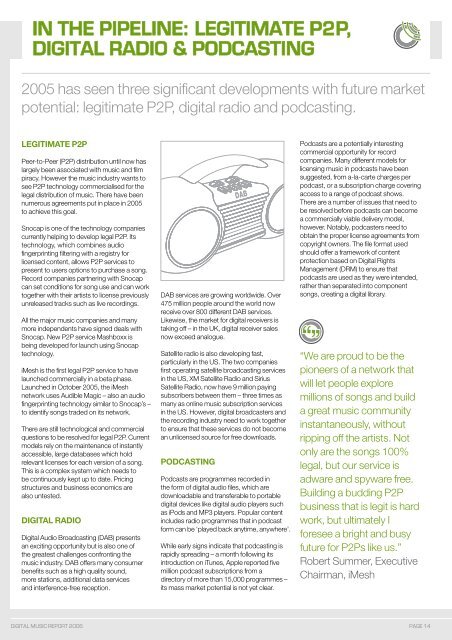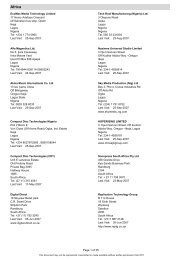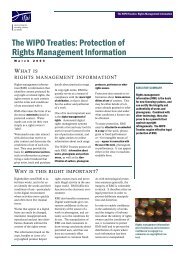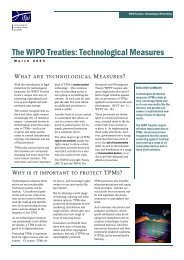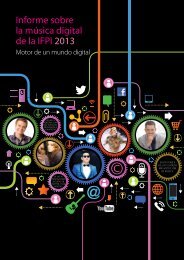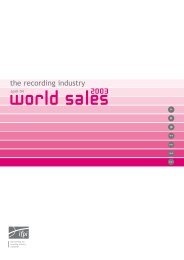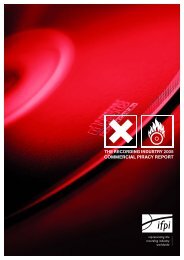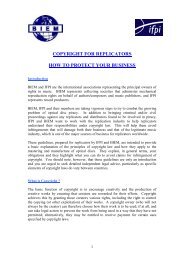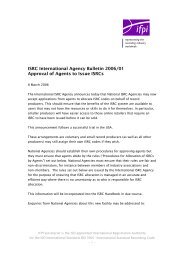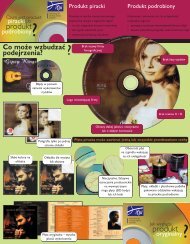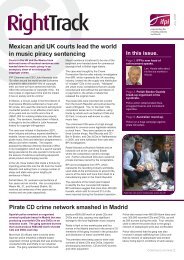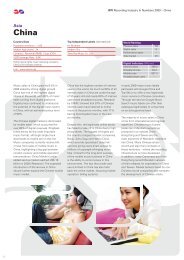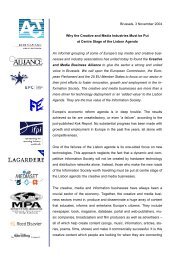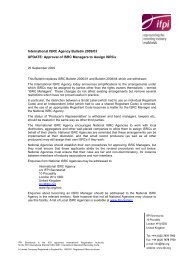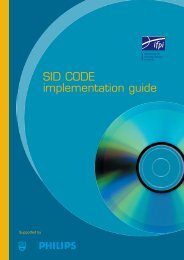2006 - IFPI
2006 - IFPI
2006 - IFPI
Create successful ePaper yourself
Turn your PDF publications into a flip-book with our unique Google optimized e-Paper software.
IN THE PIPELINE: LEGITIMATE P2P,<br />
DIGITAL RADIO & PODCASTING<br />
2005 has seen three significant developments with future market<br />
potential: legitimate P2P, digital radio and podcasting.<br />
LEGITIMATE P2P<br />
Peer-to-Peer (P2P) distribution until now has<br />
largely been associated with music and film<br />
piracy. However the music industry wants to<br />
see P2P technology commercialised for the<br />
legal distribution of music. There have been<br />
numerous agreements put in place in 2005<br />
to achieve this goal.<br />
Snocap is one of the technology companies<br />
currently helping to develop legal P2P. Its<br />
technology, which combines audio<br />
fingerprinting filtering with a registry for<br />
licensed content, allows P2P services to<br />
present to users options to purchase a song.<br />
Record companies partnering with Snocap<br />
can set conditions for song use and can work<br />
together with their artists to license previously<br />
unreleased tracks such as live recordings.<br />
All the major music companies and many<br />
more independents have signed deals with<br />
Snocap. New P2P service Mashboxx is<br />
being developed for launch using Snocap<br />
technology.<br />
iMesh is the first legal P2P service to have<br />
launched commercially in a beta phase.<br />
Launched in October 2005, the iMesh<br />
network uses Audible Magic – also an audio<br />
fingerprinting technology similar to Snocap’s –<br />
to identify songs traded on its network.<br />
There are still technological and commercial<br />
questions to be resolved for legal P2P. Current<br />
models rely on the maintenance of instantly<br />
accessible, large databases which hold<br />
relevant licenses for each version of a song.<br />
This is a complex system which needs to<br />
be continuously kept up to date. Pricing<br />
structures and business economics are<br />
also untested.<br />
DIGITAL RADIO<br />
Digital Audio Broadcasting (DAB) presents<br />
an exciting opportunity but is also one of<br />
the greatest challenges confronting the<br />
music industry. DAB offers many consumer<br />
benefits such as a high quality sound,<br />
more stations, additional data services<br />
and interference-free reception.<br />
DAB services are growing worldwide. Over<br />
475 million people around the world now<br />
receive over 800 different DAB services.<br />
Likewise, the market for digital receivers is<br />
taking off – in the UK, digital receiver sales<br />
now exceed analogue.<br />
Satellite radio is also developing fast,<br />
particularly in the US. The two companies<br />
first operating satellite broadcasting services<br />
in the US, XM Satellite Radio and Sirius<br />
Satellite Radio, now have 9 million paying<br />
subscribers between them – three times as<br />
many as online music subscription services<br />
in the US. However, digital broadcasters and<br />
the recording industry need to work together<br />
to ensure that these services do not become<br />
an unlicensed source for free downloads.<br />
PODCASTING<br />
Podcasts are programmes recorded in<br />
the form of digital audio files, which are<br />
downloadable and transferable to portable<br />
digital devices like digital audio players such<br />
as iPods and MP3 players. Popular content<br />
includes radio programmes that in podcast<br />
form can be ‘played back anytime, anywhere’.<br />
While early signs indicate that podcasting is<br />
rapidly spreading – a month following its<br />
introduction on iTunes, Apple reported five<br />
million podcast subscriptions from a<br />
directory of more than 15,000 programmes –<br />
its mass market potential is not yet clear.<br />
Podcasts are a potentially interesting<br />
commercial opportunity for record<br />
companies. Many different models for<br />
licensing music in podcasts have been<br />
suggested, from a-la-carte charges per<br />
podcast, or a subscription charge covering<br />
access to a range of podcast shows.<br />
There are a number of issues that need to<br />
be resolved before podcasts can become<br />
a commercially viable delivery model,<br />
however. Notably, podcasters need to<br />
obtain the proper license agreements from<br />
copyright owners. The file format used<br />
should offer a framework of content<br />
protection based on Digital Rights<br />
Management (DRM) to ensure that<br />
podcasts are used as they were intended,<br />
rather than separated into component<br />
songs, creating a digital library.<br />
“We are proud to be the<br />
pioneers of a network that<br />
will let people explore<br />
millions of songs and build<br />
a great music community<br />
instantaneously, without<br />
ripping off the artists. Not<br />
only are the songs 100%<br />
legal, but our service is<br />
adware and spyware free.<br />
Building a budding P2P<br />
business that is legit is hard<br />
work, but ultimately I<br />
foresee a bright and busy<br />
future for P2Ps like us.”<br />
Robert Summer, Executive<br />
Chairman, iMesh<br />
DIGITAL MUSIC REPORT <strong>2006</strong> PAGE 14


